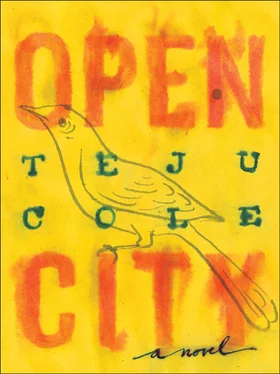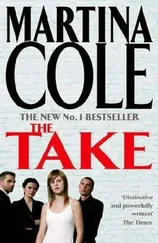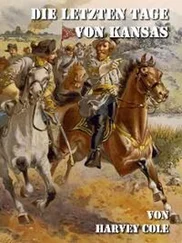My friend was especially passionate about jazz. Most of the names and styles that he so delighted in meant little to me (there are apparently any number of great jazz musicians from the sixties and seventies with the last name Jones). But I could sense, even from my ignorant distance, the sophistication of his ear. He often said that he would sit down at a piano someday and show me how jazz worked, and that when I finally understood blue notes and swung notes, the heavens would part and my life would be transformed. I more than half-believed him, and would even occasionally worry about why I seemed not to have a strong emotional connection with this most American of musical styles. Too often, it merely sounded sweet to me, cloying even, and I especially disliked it as background music. As my friend and I talked, a homeless man sang just across the street from us, and we caught his voice in the snatches as the wind came over in gusts.
These pleasant thoughts were interrupted by a presentiment of the conversation I would have that evening with Nadège. And how odd it was, hours later, to hear her strained voice, in counterpoint with the protesters down below. She had moved to San Francisco a few weeks before, and we had said we would make an effort to work things out at the distance, but we’d said the words without meaning them.
I tried to imagine her in that crowd, but no image came to mind, nor could I picture her face as it would be if she’d been in the room with me. The voices of the protesters soon faded, as the marchers drifted off with their flags and whistles toward Morningside Park. The heart-altering thump of their martial drum went on, and then that faded too, and I could hear only her diminished voice at the other end of the line. It was painful, this breaking apart, but it surprised neither of us.
THE FOLLOWING EVENING, ON THE 1 TRAIN, I SAW A CRIPPLE dragging his broken leg behind him as he moved from car to car. He adjusted his voice to a reedier tone to make his body seem more frail. I disliked his act and refused to give him money. A few minutes later, when I got on the platform, I saw a blind man. His long white stick ended in a tennis ball, and he swept it in a limited arc in front of him and to his side, and when he came close to falling (so it seemed to me) off the edge of the platform, I went up to him and asked if I could help. Oh no, he said, oh no, I’m just waiting for my train, thank you. I left him and walked the length of the platform, toward the exit. I was confused to see, just at that moment, another blind man, who also carried a long white stick with a tennis ball at its end, and who, ahead of me, climbed the stairs out into the light.
I got the idea that some of the things I was seeing around me were under the aegis of Obatala, the demiurge charged by Olodumare with the formation of humans from clay. Obatala did well at the task until he started drinking. As he drank more and more, he became inebriated, and began to fashion damaged human beings. The Yoruba believe that in this drunken state he made dwarfs, cripples, people missing limbs, and those burdened with debilitating illness. Olodumare had to reclaim the role he had delegated and finish the creation of humankind himself and, as a result, people who suffer from physical infirmities identify themselves as worshippers of Obatala. This is an interesting relationship with a god, one not of affection or praise but of antagonism. They worship Obatala in accusation; it is he who has made them as they are. They wear white, which is his color, and the color of the palm wine he got drunk on.
It had been months since I had last been to a movie. At around ten, I entered a bookshop, one of the famous chains, to kill some time before the film began, and as I went in I remembered a book I had wanted to look at for a long time: a book of historical biography by one of my patients. I found it quickly— The Monster of New Amsterdam —and settled in among the quieter stacks to read it. V., an assistant professor at New York University and a member of the Delaware tribe, had based the book on her doctoral dissertation at Columbia. It was the first comprehensive study of Cornelis Van Tienhoven. Van Tienhoven had been notorious as a seventeenth-century schout of New Amsterdam, officially empowered to enforce the law among the Dutch colonists of Manhattan Island. He had arrived in 1633, as a secretary for the Dutch East India Company, but as he climbed up the social ladder, he became known for his many brutal acts, notable among them a raid he led to murder Canarsie Indians on Long Island, after which he had brought back the victims’ heads on pikes. In another raid, Van Tienhoven had been at the head of a party of men that murdered over a hundred innocent members of the Hackensack tribe. V.’s book made for grim reading. It was full of violent events, and in the endnotes were reprinted the relevant seventeenth-century records. These were written in calm and pious language that presented mass murder as little more than the regrettable side effect of colonizing the land. In its patient recounting of these crimes, The Monster of New Amsterdam was like those biographies of Pol Pot, Hitler, or Stalin that almost always did well on the bestseller lists. A sticker on the cover of the copy I was holding indicated that it had been nominated for the National Book Critics Circle Award. The blurbs on the flyleaf, written by leading American historians, were fulsome, praising the book for shedding light on a forgotten chapter in colonial history. From time to time during the previous couple of years, reading the newspaper, I had seen some aspect of this critical acclaim, and for this reason, I had heard V.’s name and had some sense of her professional success before she ever became my patient.
When I began treating her for depression at the beginning of last year, I was surprised by her shy manner and slight frame. She was a little older than I, but appeared much younger, and she was at work on her next project, which as she explained it, was a broader study of the encounters between the northeastern native groups — the Delaware and Iroquois in particular — and European settlers in the seventeenth century. V.’s depression was partly due to the emotional toll of these studies, which she once described as looking out across a river on a day of heavy rain, so that she couldn’t be sure whether the activity on the opposite bank had anything to do with her, or whether, in fact, there was any activity there at all. Her biography of Van Tienhoven, pitched though it was to a general readership, came with all the scholarly apparatus and with much of the emotional distance typical of an academic study. But it was clear, too, from talking to her that the horrors Native Americans had had to endure at the hands of the white settlers, the horrors, in her view, that they continued to suffer, affected her on a profound personal level.
I can’t pretend it isn’t about my life, she said to me once, it is my life. It’s a difficult thing to live in a country that has erased your past. She fell silent, and the sensation created by her words — I remember experiencing it as a subtle shift in the air pressure of the room — deepened in the silence, so that all we could hear was the going and coming outside my office door. She had closed her eyes for a moment, as though she had fallen asleep. But then she continued, her shut eyelids now trembling: There are almost no Native Americans in New York City, and very few in all of the Northeast. It isn’t right that people are not terrified by this because this is a terrifying thing that happened to a vast population. And it’s not in the past, it is still with us today; at least, it’s still with me. She stopped, and then she opened her eyes, and as I recalled all this sitting on the carpet between those tall shelves at the bookshop, I could picture V.’s curiously serene face that afternoon, on which the only physical signs of distress were her tear-filled eyes. I got up and went to the counter, and paid for the book. I knew I would not have time to read all of it, but I wanted to think more about what she had written, and I also hoped that the book might, in those moments when it left the strict historical record and betrayed some subjective analysis, give me further insight into her pyschological state.
Читать дальше












